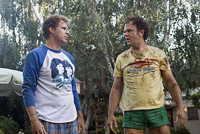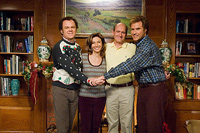Is Step Brothers critic-proof? Just about. While it’s fairly unlikely that it will enjoy the same kind of record-shattering, blockbusting success Step Brothers is enjoying, it’s fair to say that a significant section of the population is likely to escape the heat with this big, dumb, outlandish summer comedy, largely because of the movie’s biggest star: Will Ferrell, arguably the reigning king of big, dumb, outlandish summer comedies. And, of course, there will also be a good chunk of people who avoid it at all costs, choosing instead to enjoy a second or third screening of WALL•E or the Batman movie, and for largely the same reason: Will Ferrell.
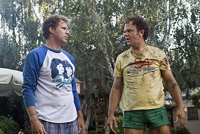
In other words, it’s more or less what you’d expect, and, if you’ve seen the teaser trailers or the goofy movie posters, you know what all the critical pieces are already: Ferrell. His TalledegaNights co-star John C. Reilly. Producer Judd Apatow (Knocked Up, Superbad). Director Adam McKay (Anchorman). And the plot: two middle-aged men—still living at home—who are forced to live together when their single parents get married to one another. That’s pretty much all you need to know to figure out which of the two camps you fall into. And one more: it’s rated R.
If you like Apatow’s brand of bawdy comedies, Ferrell’s inspired silliness (particularly when paired with his perfect on-screen foil, Reilly), and humor that’s raw and R-rated, then Step Brothers might be the most riotously funny flick this side of Knocked Up or Wedding Crashers. It’s an edgy and unhinged piece of big-screen absurdity that’s shocking and surprising, filled with all the Apatow and/or Ferrell hallmarks—stoner humor, ridiculous antics, non-stop vulgarity, and, of course, a bit of male nudity.
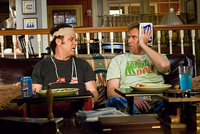
If that’s your thing, Ferrell is funnier and rawer than he’s been since Old School. Reilly continues to carve out a niche as an endearingly dumb big-screen funnyman, proving that he deserves to share the marquee with Ferrell, as the two of them have a volatile and outrageous chemistry together. Meanwhile, the great character actor Richard Jenkins, last seen in indie film The Visitor, actually gets a couple of the movie’s biggest laughs, and Mary Steenburgen, who shared the screen with Ferrell in Elf, is suitably likable and charming. The script, just about perfect for this kind of thing, gives Ferrell and Reilly ample space to riff off each other and outdo one another with ridiculous turns of phrase and silly insults, while also keeping the audience on their feet with a few rather unexpected twists (i.e., murder?).
It’s a perfect project for Ferrell, reuniting him with the director who gave him his most enduringly funny movie (Anchorman), the co-star with whom he created such potent comedic chemistry (Talladega Nights), a producer who allows him to be as dangerous as he wants to be, a supporting cast that doesn’t allow him to steal the spotlight completely, and a ridiculously goofy character that he was born to play—middle-aged slob, unemployed geek, dimwitted mama’s boy. That pretty much says it all.
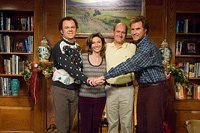
But perhaps most unexpected is the fact that, amidst all bawdy language, sexual humor, nudity and violence, there’s a surprising amount of heart to this movie—much as has been the case in over movies from Camp Apatow. Credit belongs to Jenkins and Steenburgen as much as anyone for giving the two parents a real emotional pull, especially when their living situation becomes tenuous and their boys grow increasingly out of control. There are some subtle messages about the need to grow up, to put away childish things and act like a grownup, but also to maintain a certain sense of childlikeness. And though the film takes a fairly light view of divorce, and a running subplot treats adultery as something fairly minor, the movie also attempts to affirm, on some level, the importance of family.
But of course, if you’re reading this and shaking your head in disbelief, you probably know already that Step Brothers isn’t your thing. A film like this plays to folks with a certain sense of humor, and a high tolerance for the bawdy, the silly, and the shocking. If the thought of Ferrell beating Reilly with a bicycle, or of Jenkins setting Ferrell across his knee and spanking him, or of Ferrell and Reilly showing up at an interview for a custodial position while wearing tuxedos and sneakers—if none of that sounds funny, then the vulgar language and explicit humor you’d have to sit through surely won’t be time well spent.
That’s probably the case for many Christian moviegoers, and legitimately so—this movie is sophomoric and crude, and though one could argue for the comedic genius on display here, it’s likely too crass for the masses.
Talk About It
Discussion starters- The film’s central theme is that of immaturity versus maturity, of the need to grow up and put childish things aside. Do you think that, by the end of the film, Brennan and Dale achieve this? Why or why not?
- The ways in which Brennan and Dale are immature are obvious, but are there any regards in which Robert or Nancy need to grow up? Do you think they are good parents? Why or why not?
- How does this movie treat divorce? Adultery? Does it have any positive messages about family? About forgiveness?
The Family Corner
For parents to considerStep Brothers is rated R for crude and sexual humor and for language, and it’s about as R-rated as summer comedies come. There is foul language almost constantly throughout the film, numerous sexual and scatological jokes, a brief shot of a man’s testicles, and a sex scene that doesn’t involve any nudity, but is still somewhat explicit. The movie also deals with divorce and adultery, arguably making light of both.
Photos © Copyright Apatow Productions
Copyright © 2008 Christianity Today. Click for reprint information.

